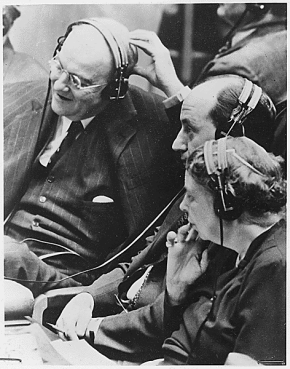
|
Adlai Stevenson Memorial Address for Eleanor Roosevelt delivered 9 November 1962, United Nations General Assembly
[AUTHENTICITY CERTIFIED: Text version below transcribed directly from audio.] Mr. President, On behalf of the delegation of the United States, I want to thank you for the eloquent and meaningful words that you have just uttered about Mrs. Roosevelt. And I come here for the second time in little more than a year, sad in heart and in spirit. The United States, the United Nations, the world has lost one of its great citizens. Mrs. Eleanor Roosevelt is dead; and a cherished friend of all mankind is gone. Yesterday, I said that I had lost more than a friend -- I had lost an inspiration: for she would rather light candles than curse the darkness and her glow had warmed the world. My country mourns here; and I know that all in this Assembly mourn with us. But even as we do, the sadness we share is enlivened by the faith that her fellow man and his future which filled the heart of this strong and gentle woman. She imparted this faith not only to those who shared the privilege of knowing her and working by her side, but to countless men, women, and children in every part of the world who loved her even as she loved them. For she embodied the vision and the will to achieve a world in which all men can walk in peace and dignity. And to this goal of a better life, she dedicated here tireless energy and the strange strength of her extraordinary personality. I don't think it amiss, Mr. president, to suggest the United Nations is in no small way a memorial to her and her aspirations. To it, she gave the last 15 years of her restless spirit. She breathed life into this organization. The United Nations has meaning and hope for millions thanks to her labors and her love, no less than to her ideals -- ideals that made her, only weeks after Franklin Roosevelt's death, put aside all thoughts of peace and quiet after the tumult of their lives to serve as one of this nation's delegates to the first regular session of the General Assembly. Her duty then, as always, was to the living, the world, to peace. Some of you in this hall were present at that first historic Assembly in London 17 years ago. More of you were witness to her work in subsequent assemblies in the years that followed. The members of the third committee, the committee on social, humanitarian, and cultural questions, and the commission on human rights which she served so long as chairman, will remember the warmth, the intelligence, and the infectious buoyancy which she brought to her tasks. You know better than any of us the unceasing crusade that helped to give the world after years of painstaking and patient travail one of the most noble documents of mankind: the Declaration of Human Rights. This is not the time to recount the infinite services of this glorious and gracious lady. The list is an inexhaustible as her energies. But devotion to the world of the charter, to the principles of the United Nations, to a world without war, to the brotherhood of man, underscored them all. And happily for us she could communicate her devotion, her enthusiasm to others: she saw clearly; she spoke simply. The power of her words came from the depth of her conviction. "We must be willing," she said, "to learn the lesson that cooperation may imply compromise, but if it brings a world advance, it is a gain for each individual nation. There will be those who doubt their ability to rise to these new heights, but the alternative," she said, "is not possible to contemplate. We must build faith in the hearts of those who doubt. We must rekindle faith in ourselves when it grows dim, and find some kind of divine courage within us, to keep on, till on earth we have peace and goodwill among men. Albert Schweitzer wrote,
Mrs. Roosevelt rekindled that faith in ourselves. Now that she is gone, the legacy of her lifetime will do no less. Mr. President, I trust you and the members of the Assembly will forgive me for having taken your time with these very personal thoughts. The issues that we debate in this hall are many and grave. But I don't think that we are divided in our grief at the passing of this great and gallant human being who was called "The First Lady of the World." Thank you, sir. Page Updated: 12/13/23 U.S. Copyright Status: Text and Image = Public domain. This text/audio/image is the work of an employee of the United States Federal Government delivered/taken/made during the course of the personís official duties. As a work of the U.S. Federal Government, the text/audio/image is in the public domain. |
|
|
© Copyright 2001-Present. |
